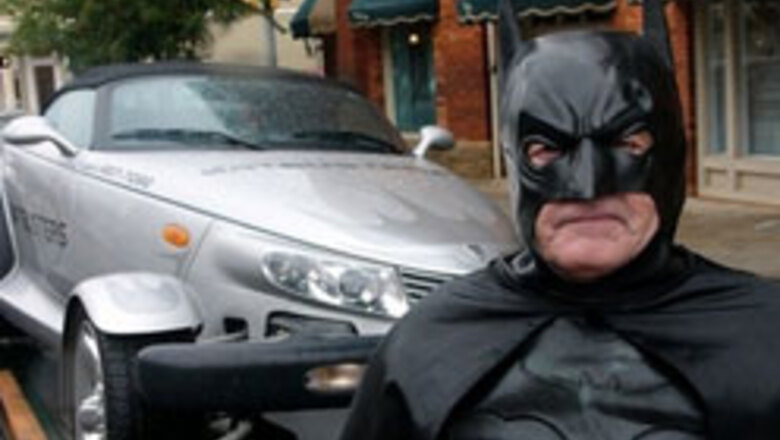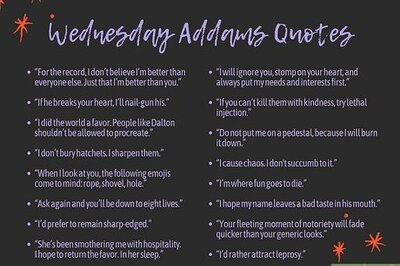
views
Americus: So many bats have infested the town's historic district that the sky turns black with each sunset and the neighborhood is calling on Batman to come to the rescue.
That's what the local bat remover goes by George Perkins often makes public appearances in the caped crusader's costume and drives his own Batmobile — a retro-styled Chrysler Prowler with bat emblems.
Callers to his office in Eufaula, known as Bat Cave 1, or Union Springs, known as Bat Cave 2, hear the Batman TV show theme while on hold.
The bat-weary residents of Americus aren't laughing. The problem is even too big for Batman, and now the state has promised to help.
The Georgia Department of Natural Resources has proposed a long-term plan that includes surveying the bat population, possibly training city workers to do bat removals for needy homeowners and building bat houses in safe areas where the flying mammals can continue providing environmental benefits without being a nuisance.
"They're perpetual crap machines," said Tripp Pomeroy, who moved to the town of 17,000 in 1989 to work for Habitat for Humanity, which has its global headquarters in Americus.
Pomeroy, now the co-owner of a fair-trade, organic coffee company known as Cafe Campesino, said he's spent $1,500 trying to evict bats from the attic of his 96-year-old traditional Southern home. Because of the health risks, he's reluctant to let his children sleep in their upstairs bedrooms.
Millions of bats — the leading cause of human rabies in the US — have moved into the attics of Antebellum and Greek Revival mansions built in the 1800s and Victorian homes from the early 1900s in Americus' historic district covering about a third of the town's 10 square miles.
"The homes ... in this small town are like art," said Deanna Burgess, a Minnesota native who recently moved into a Greek Revival home built in 1856.
"They need to be brought back and preserved for future generations."
A previous owner evicted the bats from Burgess' home, but she sees them flying into nearby homes.
The bats swarm out in the evening and perform a community service by eating mosquitoes, gnats and other pests from twilight to dawn. Then, as the sun begins to rise, they head back to their dark attic lairs, where they urinate and leave piles of smelly guano.
Residents can't kill the bats because they are protected under Georgia law, like chipmunks and other non-game animals. Killing one carries a penalty of up to a year in jail and a $1,000 fine.
So they try to exclude them by plugging openings in their homes, a difficult task since bats can squeeze through holes as small as a dime.
Those who can afford professional help, send a distress signal to Perkins.
"This town is in bad shape. There are millions of bats. In one house alone, I estimated 10,000 in the attic," said Perkins, a 56-year-old former contractor who launched his company, Batbusters, after a young Eufaula woman died from rabies in the early 1990s after touching bats that flew into her office building.
PAGE_BREAK
Perkins scampers up ladders with tubes of sealer and wire mesh to plug holes and create one-way doors that let the bats out, but not back in. He also crawls into attics with the bats. Once, he found a layer of guano eight inches deep.
From 1990 to 2005, 31 of the 39 cases of human rabies were linked to rabies, making them the leading rabies threat to humans, according to the Atlanta-based federal Centers for Disease Control and Prevention.
Because bats have tiny teeth that don't leave obvious punctures, people may not even realise they've been bitten. Humans also can get rabies from a scratch or contact with bat saliva.
The disease usually kills animals and humans within 10 days, unless they get anti-rabies shots. In humans, that means six shots given over 30 days.
Perkins said he's been bitten often and has been a frequent recipient of the anti-rabies vaccine.
Americus' historic district is not just for rich folks. There are plenty of working-class and middle-class families, as well as widows on fixed incomes who have lived in their homes for years.
Some try do-it-yourself approaches. Others just try to live with the bats and their stench.
When one homeowner manages to evict them, they move to another house. Homeowners often complain of the stench from a neighbour's house.
"In some areas, the odor is unbearable on hot summer days," said Lane Tyson, 26, who fights to keep bats out of his early 1900s home.
At their wits end, homeowners appealed to their state representative, Democrat Mike Cheokas, and about 35 of them met recently with state officials.
In response, the state's top wildlife official, Mike Harris, says his agency will launch a year-long program to address the town's bat problems.
In a letter to city officials, Harris said free-tailed bats have apparently expanded their range and number in Georgia and have adapted to roosting in buildings in many towns across the state.
There are many other bat species, but it's the free-tail variety that seem to be causing the most problems in Americus.
"We recognise that bats provide a valuable ecological service by consuming vast quantities of night-flying insects, many of which are significant pests to farmers and homeowners," Harris said.
"However, we certainly don't expect people to tolerate bats roosting in their homes and businesses," he added.




















Comments
0 comment